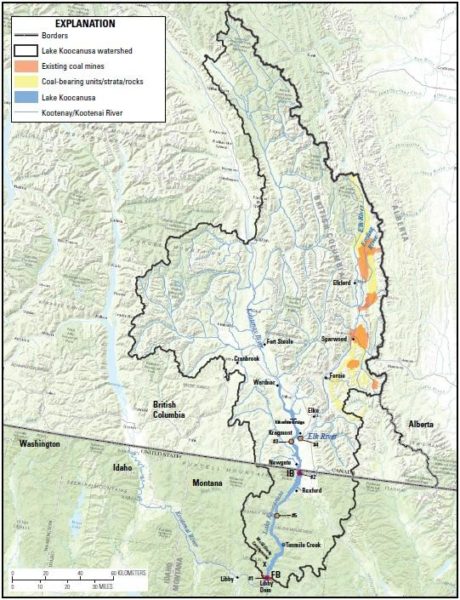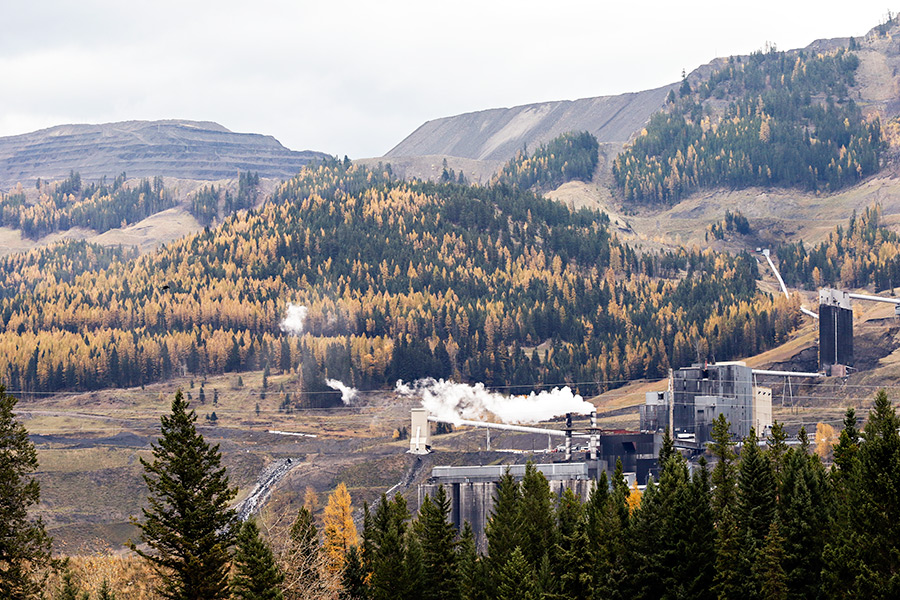In a joint June 13 letter to British Columbia Premier John Horgan, a bipartisan slate of senators from all four states bordering the coal-rich Canadian province is pressing its top official to recognize the urgency of safeguarding U.S. waters from mining pollutants spilling downstream into shared transboundary watersheds.
In the latest and most authoritative appeal for Canadian officials to adopt more stringent water-quality standards, all eight senators from Alaska, Montana, Washington, and Idaho drafted a letter highlighting the ongoing efforts to mitigate the environmental and economic impacts resulting from large-scale hard rock and coal mines in British Columbia, as well as to draw attention to B.C.’s regulatory shortcomings surrounding natural resources shared by the neighboring nations.
“While we appreciate Canada’s engagement to date, we remain concerned about the lack of oversight of Canadian mining projects near multiple transboundary rivers that originate in B.C. and flow into our four U.S. states,” the letter states.
The bipartisan group of elected officials who drafted and signed on to the letter includes U.S. Sens. Steve Daines, R-Mont., and Jon Tester, D-Mont., as well as Lisa Murkowski, R-Alaska, Dan Sullivan, R-Alaska, Patty Murray, D-Wash., Maria Cantwell, D-Wash., James Risch, R-Idaho, and Mike Crapo, R-Idaho. The letter serves as a political flex and helps elevate downstream U.S. concerns by emphasizing the need to improve B.C.’s mining sector safeguards. The letter also references the need for binding protections and financial assurances to align B.C.’s mining laws with those in the U.S.
“As you know, Alaska, Washington, Idaho, and Montana have tremendous natural resources that need to be protected against impacts from B.C. hardrock and coal mining activities near the headwaters of shared rivers, many of which support environmentally and economically significant salmon populations. Additionally, indigenous peoples whose lands are affected by past, present, and proposed mines near transboundary rivers have voiced concern and requested that the U.S. and Canadian governments undertake cumulative assessments of impacts to communities, cultural and natural resources, as well as the enforcement of the Boundary Waters Treaty of 1909,” the letter states. “These transboundary watersheds support critical water supply, recreation opportunities, and wildlife habitat that support many livelihoods in local communities. We appreciate the diverse array of benefits that responsible management of our shared watersheds can bring, and view this as an opportunity to engage and collaborate toward a mutually beneficial future.”
Conservation groups, downstream neighbors and scientists from a range of agencies have been tracking the inrush of upstream pollutants flowing into U.S. waterways for decades, during which time they say B.C.’s large-scale, open-pit hard rock and coal mines have polluted rivers and fouled waters with acid mine drainage and other contaminants, such as selenium and nitrates.

For example, in the watershed that includes B.C.’s famed Elk River and Montana’s prized Kootenai River and the sprawling reservoir at Lake Koocanusa, a resource shared by Idaho, Montana and B.C., selenium from Teck Resources’ coal mines has killed and deformed fish while threatening native trout species and endangered Kootenai River white sturgeon.
Based on data compiled by the U.S. Geological Survey and Montana Department of Environmental Quality, annual selenium loads entering Lake Koocanusa have increased from 2,600 kilograms in 1992 to more than 13,000 kg in 2012, representing more than a fivefold increase over the course of 20 years.
According to Montana Fish, Wildlife and Parks (FWP), muscle-tissue samples from seven species of fish in Lake Koocanusa collected in 2008 and again in 2013 show increasing trends in elevated selenium levels; moreover, the inrush of selenium won’t abate even if the mining operations shut down production, such is the scope of the footprint and the size of waste-rock piles leaching into the waterways.
During the five-year period between 2008 and 2013, FWP biologists tracked increases of selenium in muscle-tissue concentrations at rates of between 21 and 70 percent, a trend they described as alarming.
Concerns about the impaired watersheds and the probability that such contamination will continue leaching into them for decades — even if more stringent standards and abatement actions are enacted — has prompted a volley of requests from federal, state and tribal officials to redress the issue and set it right by enacting new standards or halting mining operations.
Environmental watchdog groups and other stakeholders said the eight-senator letter marked the first step toward having a federal-to-federal conversation about aligning the two nations’ water-quality monitoring standards.
“Today we are finally taking the necessary steps to resolve an international crisis that is impacting an entire ecosystem,” said Michael Jamison, senior program manager for the National Parks and Conservation Association’s Crown of the Continent office. “There has to be federal-to-federal engagement on this because it’s affecting resources on both sides of the border. B.C. certainly has the right to extract its natural resources, but we have the right to some assurance that our water isn’t going to be laced with their mining contaminants. B.C. loves to tell us how they have the world’s most modern mining standards, but the truth is they don’t. They need to adopt the standards we have in the U.S. We’re fortunate to have senators who know the value of partnering across borders to protect our shared waterways, as well as the importance of holding our neighbors accountable.”
Members of several environmental groups praised the senators’ letter as a critical call to action, and thanked U.S. federal lawmakers who allocated $1.8 million to monitor water quality in the four border states’ transboundary rivers. The senators’ concerns have also been echoed by other individual members of Congress, as well as the gubernatorial administrations of Montana, Washington and Alaska, tribes and First Nations on every border, state legislators, municipalities, fishermen, businesses, recreation outfits, and residents of both B.C. and the U.S.
In Alaska, acid mine drainage into the transboundary Taku River, which stands out among the region’s most productive waterways for spawning salmon, has continued for more than 60 years. Compounding threats, B.C. is rapidly approving new mines and expanding existing mines in the lands around all four surrounding states’ rivers, according to the letter. Most recently, British Columbia opened a permit process for a controversial new mine in the headwaters of the Skagit River, which flows into Washington state through North Cascades National Park, and into the Puget Sound.
Meanwhile, current B.C. environmental regulations do not require cumulative analysis of mining impacts to shared rivers, even if the surrounding land bristles with mining claims and leases. The regulations also don’t require consent from First Nations, private property owners, or allow for meaningful public input by U.S. stakeholders and tribal citizens.
Other recent actions include a human rights petition filed by 15 of Southeast Alaska’s 19 recognized tribes; a letter of complaint regarding exclusion from the decision-making process filed by Indigenous leadership in Alaska, Washington, Idaho, Montana and B.C.; and joint state-federal letters of concern and a formal complaint by U.S. federal water negotiators that their Canadian counterparts were refusing to acknowledge best available science in B.C.’s shared transboundary rivers.
The transboundary Stikine River shared by Alaska and B.C. was recently named to American Rivers’ “Most Endangered” list due to transboundary mining (a distinction shared in recent years for identical reasons by the Kootenai River tracking between B.C. and Montana).
In May, tribal leaders in Washington state expressed grave concerns regarding B.C.’s plans to allow Imperial Metals to mine the headwaters of the Skagit River, which supports critical salmon habitat in Seattle’s Puget Sound area. They warned of “the potential for disastrous results,” and noted that just five years ago a mine failure by the same company released millions of gallons of toxic copper and gold tailings into B.C. lakes, drinking water and salmon runs.
“The Skagit River is critical to the survival of salmon and orca,” Scott Schuyler, policy expert for the Upper Skagit Indian Tribe, wrote in a statement. “It’s the lifeblood that connects the ocean with the mountain interior, and any thought of mining its headwaters only proves how out of touch British Columbia’s regulators are.”
Similar concerns are echoed by members of Alaska’s commercial fishing industry who asked for federal intervention to hold B.C.’s mining regulators accountable.
“This is a multi-state, international problem for which we need a multi-state, international solution,” United Fishermen of Alaska Executive Director Frances Leach wrote in a statement. “Right now B.C.’s massive open-pit mines and waste dumps put some of Alaska and B.C.’s most important salmon rivers, and the fishing jobs that rely on them, at risk. Alaska fishermen and the thousands of people across the world who enjoy wild Alaska salmon expect and deserve better from B.C. regulators.”
Montana fishing guides agree, particularly as they chart a steady uptick in concentrations of mining contaminants rushing into cherished watersheds from upstream Canadian coal mines operated by Teck Resources.
“The United States is not a settling pond for Teck Resources and the rest of Canada’s mining industry,” former Kootenai River fishing guide Mike Rooney said. “It’s our hope that Secretary of State Michael Pompeo and Premier John Horgan act to protect our businesses, resources and citizens by requesting intervention under the Boundary Waters Treaty. Anything less is not the solution this international problem deserves.”
In Idaho, millions of dollars have been spent recovering endangered sturgeon in transboundary rivers, and upstream mining pollutants threaten to undo those efforts.
“We commend our Congressional leaders for taking steps towards a long-term solution that will benefit our waterways on both sides of the border,” Matthew Nykiel, conservation associate with the Idaho Conservation League, stated in the press release. “A letter like this is a powerful message to British Columbia, and it shows that we are stronger together. Mining in the B.C. headwaters of transboundary rivers is a problem we all share, and it will require an international response to solve it.”
